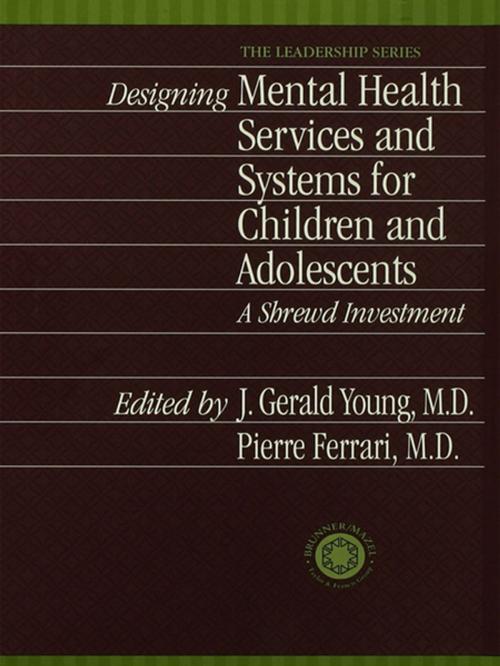Designing Mental Health Services for Children and Adolescents
A Shrewd Investment
Nonfiction, Health & Well Being, Psychology, Clinical Psychology| Author: | J. Gerald Young, Pierre Ferrari | ISBN: | 9781134940455 |
| Publisher: | Taylor and Francis | Publication: | March 7, 2013 |
| Imprint: | Taylor & Francis | Language: | English |
| Author: | J. Gerald Young, Pierre Ferrari |
| ISBN: | 9781134940455 |
| Publisher: | Taylor and Francis |
| Publication: | March 7, 2013 |
| Imprint: | Taylor & Francis |
| Language: | English |
An exceptional opportunity is being missed. A chance to alleviate suffering and to achieve health care cost reductions for society is available, but is being ignored. There is an explosion of new knowledge about the emotional and intellectual development of children, and the causes and treatment of psychiatric disorders of children and adolescents. Research from diverse disciplines such as the developmental neurosciences, psychoanalysis, psychopharmacology, developmental psychology, and genetics propels us forward,. However, the effects of this new knowledge reach children and adolscents slowly, or not at all. The long history of neglect of the mental health of children and adolescents is now exaggurated by sudden, disruptive economic and political influences on mental health services for children and adolescents in most countries.
Prevention and treatment of emotional and intellectual problems in childhood and adolescence have vastly improved, but utilization of these advantages lags behind. This disappointing incongruity stimulates a need to document our knowledge about these services and systems and to make it more broadly available. This is the primary aim of this new volume by a team of distinguished contributors. It reviews the causes and prevalences of psychiatric disorders in children and adolescents, the problem of health care financing for these services, the underutilization of these services, our current understanding of the outcomes of treatment, and the new models for both treatment and prevention. The book also provides a survey of current mental health services and sytems for children and adolescents in countries across the world.
Information drawn from these multiple perspectives is has been used by a group of international experts to develop the Venice Declaration, providing specific guidelines for families, clinicians, administrators, and policy-makers who are concerned with the development of children and adolescents, and are committed to a more efficient economic approach to mental health services.
An exceptional opportunity is being missed. A chance to alleviate suffering and to achieve health care cost reductions for society is available, but is being ignored. There is an explosion of new knowledge about the emotional and intellectual development of children, and the causes and treatment of psychiatric disorders of children and adolescents. Research from diverse disciplines such as the developmental neurosciences, psychoanalysis, psychopharmacology, developmental psychology, and genetics propels us forward,. However, the effects of this new knowledge reach children and adolscents slowly, or not at all. The long history of neglect of the mental health of children and adolescents is now exaggurated by sudden, disruptive economic and political influences on mental health services for children and adolescents in most countries.
Prevention and treatment of emotional and intellectual problems in childhood and adolescence have vastly improved, but utilization of these advantages lags behind. This disappointing incongruity stimulates a need to document our knowledge about these services and systems and to make it more broadly available. This is the primary aim of this new volume by a team of distinguished contributors. It reviews the causes and prevalences of psychiatric disorders in children and adolescents, the problem of health care financing for these services, the underutilization of these services, our current understanding of the outcomes of treatment, and the new models for both treatment and prevention. The book also provides a survey of current mental health services and sytems for children and adolescents in countries across the world.
Information drawn from these multiple perspectives is has been used by a group of international experts to develop the Venice Declaration, providing specific guidelines for families, clinicians, administrators, and policy-makers who are concerned with the development of children and adolescents, and are committed to a more efficient economic approach to mental health services.















